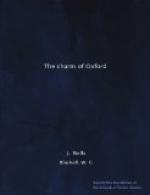Certain it is that under Elizabeth, after the purging of the college from its recusant fellows, who contributed a large share of the Roman controversialists to the colleges of Louvain and Douai, Wykeham’s foundation sank, as has been said, into inglorious ease for two centuries. Yet, during this period, it had the honour of producing two of the Seven Bishops who resisted King James II’s attack on the English Constitution—one of them the saintly hymn writer, Thomas Ken. And to the darkest days of the eighteenth century belongs the most famous picture of the ideal Oxford life: “I spent many years, in that illustrious society, in a well-regulated course of useful discipline and studies, and in the agreeable and improving commerce of gentlemen and of scholars; in a society where emulation without envy, ambition without jealousy, contention without animosity, incited industry and awakened genius; where a liberal pursuit of knowledge and a genuine freedom of thought was raised, encouraged, and pushed forward by example, by commendation, and by authority.” These were the words of Bishop Lowth, whose great work on The Poetry of the Hebrews was delivered as lectures for the Chair of Poetry at Oxford.
The spirit of Oxford has never been better described, and even that bitter critic, the great historian Gibbon, admits that Lowth practised what he preached, and that he was an ornament to the University in its darkest period. Of the days of Reform a forerunner was found in Sydney Smith, the witty Canon of St. Paul’s.
The names of New College men famous for learning or for political success, during the last half-century, are too recent to mention, but it is fitting to put on record that to New College belongs the sad distinction of having the longest Roll of Honour in the late War. It has lost about 250 of its sons, including four of the most distinguished young tutors in Oxford; History and Philosophy, Scholarship and Natural Science are all of them the poorer for the premature loss of Cheesman and Heath, Hunter and Geoffrey Smith; their names are familiar to everyone in Oxford, and they would have been familiar some day to the world of scholars everywhere. Dis aliter visum est.
LINCOLN COLLEGE
“This is the chapel; here,
my son,
Thy father dreamed the dreams of youth,
And heard the words, which, one by one,
The touch of life has turned to truth.”
NEWBOLT.
[Plate XII. Lincoln College : The Chapel Interior]
The name of Lincoln College recalls a fact familiar to all students of ecclesiastical history, though surprising to the ordinary man— viz., that Oxford, till the Reformation, was in the great diocese of Lincoln, which stretched right across the Midlands from the Humber to the Thames. This fact had an important bearing on the history of the University; its bishop was near enough to help and




